2024 to 2025 Annual Report on the Privacy Act
Introduction
The Treasury Board of Canada Secretariat (TBS) is pleased to present to Parliament its annual report on the administration of the Privacy Act (PA) for 2024–25 (, to ).
Section 72 of the PA requires that the head of every government institution prepare and submit an annual report to Parliament on the administration of the PA in the institution during the fiscal year.
Purpose of the Privacy Act
The purpose of the PA is to provide:
- individuals with the right to access and correct personal information about themselves that is under the control of a government institution
- the legal framework for the collection, retention, use, disclosure, disposition and accuracy of personal information in the administration of programs and activities by government institutions subject to the PA
Under the PA, personal information is defined as information about an identifiable individual that is recorded in any form.
Examples include information relating to:
- the national or ethnic origin, colour, religion, age or marital status of an individual
- the education or the medical, criminal, financial or employment history of an individual
- the address, fingerprints or blood type of an individual
- any identifying number, symbol or other particular identifier assigned to an individual
Mandate of the Treasury Board of Canada Secretariat
As the administrative arm of the Treasury Board, TBS has a dual mandate: to support the Treasury Board as a committee of ministers and to fulfill the statutory responsibilities of a central government agency and those of a line department.
The Treasury Board’s mandate is derived from the Financial Administration Act.
To fulfill its mandate, TBS organizes its business and resources around 4 core responsibilities:
- spending oversight
- administrative leadership
- employer
- regulatory oversight
TBS provides advice and support to Treasury Board ministers in their role of ensuring value for money. TBS also provides oversight of the financial management functions in federal institutions.
TBS makes recommendations and provides advice to the Treasury Board on policies, directives, regulations and program expenditure proposals with respect to the management of the government’s resources. TBS is responsible for the general management of government-wide initiatives, issues and activities (as reported in the Main Estimates).
The offices of the following government officials are part of TBS:
- the Comptroller General of Canada
- the Chief Human Resources Officer of Canada
- the Chief Information Officer of Canada
The Comptroller General is responsible for the comptrollership function of government and provides government-wide leadership, direction, oversight and capacity-building for financial management, internal audit, and the management of assets and acquired services.
The Chief Human Resources Officer provides government-wide leadership on people management through policies, programs and strategic engagement by centrally managing labour relations, compensation, pensions and benefits, and by contributing to the management of executives.
The Chief Information Officer provides government-wide leadership, direction, oversight and capacity-building for information management, information technology, government security (including identity management), access to information, privacy, and internal and external service delivery.
Delegation order for the Privacy Act
Pursuant to subsection 73(1) of the PA, the President of the Treasury Board has delegated the powers, duties and functions for the administration of the PA to the following TBS officials:
- the Secretary of the Treasury Board
- the Assistant Secretary of Strategic Communications and Ministerial Affairs
- the Senior Director of Ministerial Services
- the Director of Access to Information and Privacy (ATIP)
- managers and team leaders of the ATIP office
The delegation order was signed on , and a copy can be found in Appendix A.
Organization structure
The ATIP office is part of the Ministerial Services directorate of TBS’s Strategic Communications and Ministerial Affairs sector.
The ATIP office is responsible for:
- implementing and managing programs and services relating to TBS’s administration of the Access to Information Act (ATIA) and the PA (the acts)
- providing advice to TBS employees as they fulfill their obligations under the acts
- reviewing and releasing records under Part 2 of the ATIA; specifically, briefing note titles, parliamentary committee appearance binders, question period notes and transition binders
Outside of the administration of the acts, the ATIP office provides support in the following areas:
- internal reviews of documents intended for publication by sectors
- reviews of documents subject to parliamentary production motions
- reviews of documents related to class action lawsuits
- training sessions on the administration of the acts for sectors and sector officials
- policy updates and research related to the administration of the acts
- research and reporting on trends in the ATIP office
- systems administration of ATIP software
- various reports
- privacy breach management
- access to information and privacy advice to program sectors
The ATIP office is led by a director who is supported by three managers. Each of these managers oversees a unit that is responsible for a different functional area. The three key units include:
- ATIP Intake, Governance, and Special Projects Unit
- ATIP Operations Unit
- Privacy Policy Unit
The ATIP Intake, Governance, and Special Projects Unit and the ATIP Operations Unit work together to process ATIP requests, whereas the Privacy Policy Unit supports sector officials on privacy-related matters, including the review of privacy impact assessments and privacy breach management.
The ATIP office comprises employees at various levels. There was an equivalent of 8.44 full-time employees who administered the PA in 2024–25, consisting of 7.59 full-time employees and 0.85 part-time employee. There was an additional equivalent of 15.05 full-time employees who administered the ATIA in 2024–25, consisting of 14.84 full-time employees and 0.21 casual employee. Certain employees in the ATIP office contribute to both the ATIA and the PA, and these activities are recorded in the appropriate report proportional with their contributions.
Figure 1 shows the roles of the individuals and teams involved in processing ATIP requests at TBS. The ATIP office has 3 functional units. Sector liaison officers are not part of the ATIP office but play an important role in processing requests because they coordinate ATIP activities in their respective sectors.
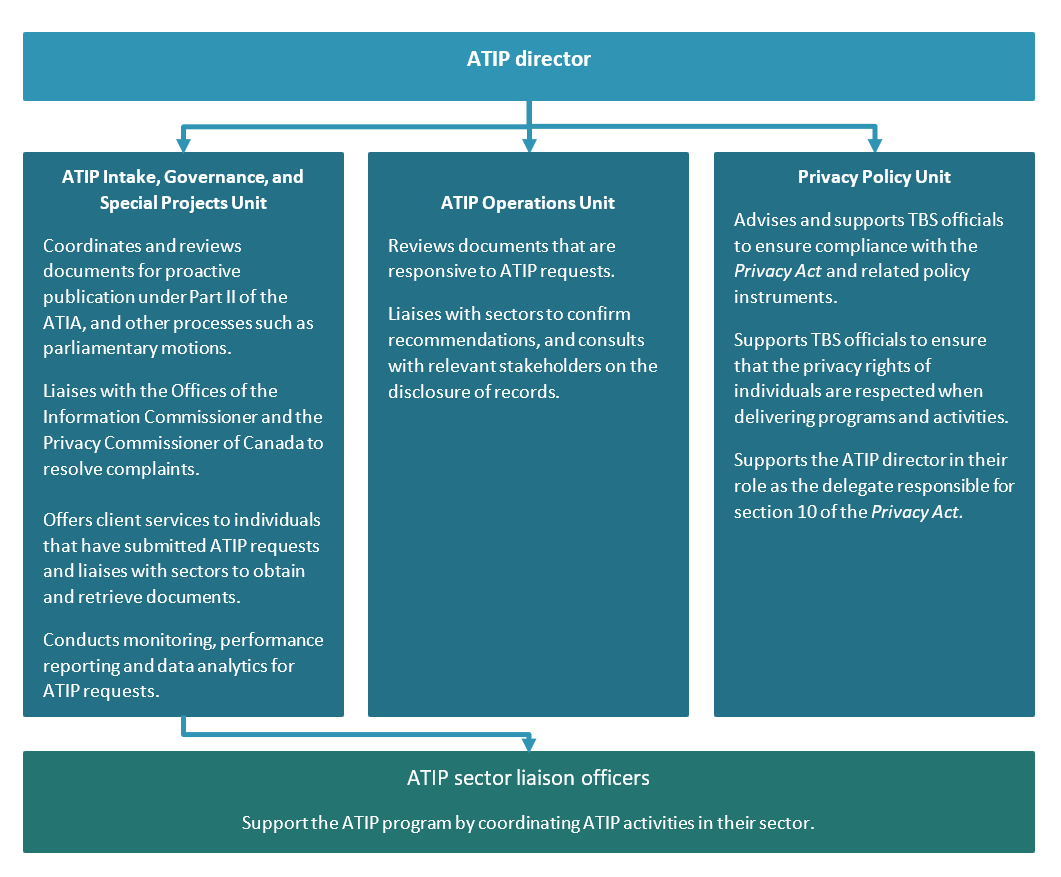
Figure 1 - Text version
ATIP director
ATIP Intake, Governance, and Special Projects Unit:
Coordinates and reviews documents for proactive publication under Part II of theATIA, and other processes such as parliamentary motions.
Liaises with the Offices of the Information Commissioner and the Privacy Commissioner of Canada to resolve complaints.
Offers client services to individuals that have submitted ATIP requests and liaises with sectors to obtain and retrieve documents.
Conducts monitoring, performance reporting and data analytics for ATIP requests.
ATIP Operations Unit:
Reviews documents that are responsive to ATIP requests.
Liaises with sectors to confirm recommendations, and consults with relevant stakeholders on the disclosure of records.
Privacy Policy Unit:
Advises and supports TBS officials to ensure compliance with the Privacy Act and related policy instruments.
Supports TBS officials to ensure that the privacy rights of individuals are respected when delivering programs and activities.
Supports the ATIP director in their role as the delegate responsible for section 10 of the Privacy Act.
ATIP sector liaison officers
Support the ATIP program by coordinating ATIP activities in their sector.
The TBS ATIP office works with the 19 sectors across TBS that retrieve responsive records to ATIP requests. Each sector has assigned sector liaison officers that work directly with the ATIP office to efficiently process requests. The ATIP office also works in partnership with sectors across TBS to complete proactive publication requirements under Part 2 of the ATIA.
Interpretation of the statistical report for the Privacy Act
Introduction
Statistical reports prepared by government institutions provide aggregate data on the application of the ATIA and the PA. This section outlines key metrics in the statistical reports on the administration of the PA within TBS.
Part 1: requests received and carried forward
Privacy requests received
In 2024–25, TBS received 173 requests under the PA, which represents an 9% decrease from the 191 requests received in 2023–24.
Privacy requests carried forward
The number of requests that the TBS ATIP office carried forward from previous fiscal years was 34, which is an increase of 36% compared to the 25 requests carried forward in 2023–24.
Figure 2 shows the number of privacy requests TBS received each year and the number of requests carried forward for 2020–21 to 2024–25.
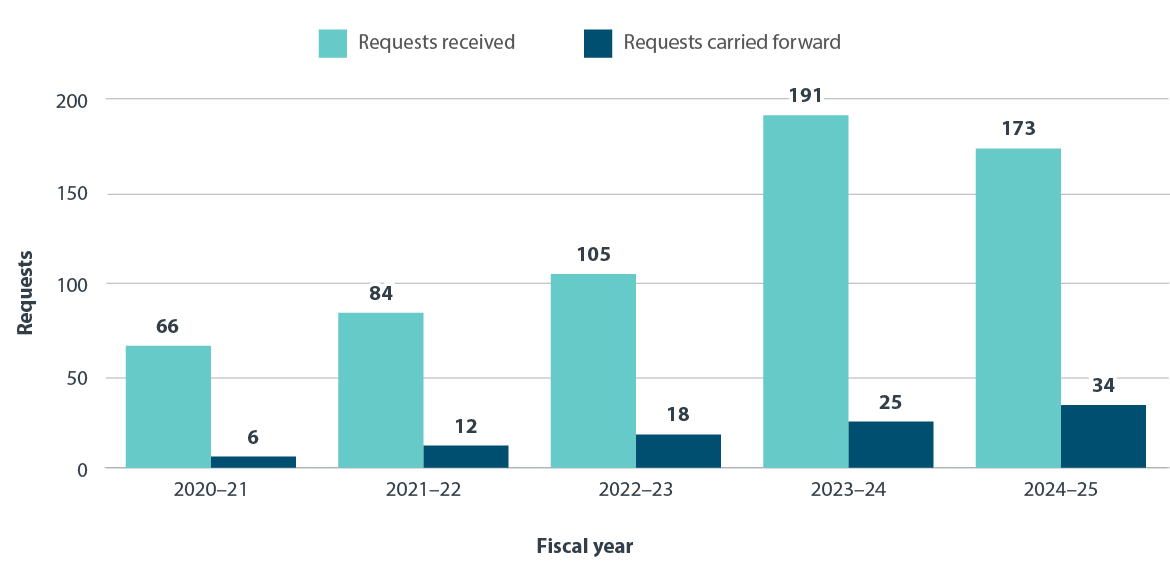
Figure 2 - Text version
| Fiscal year | 2020–21 | 2021–22 | 2022–23 | 2023-24 | 2024-25 |
|---|---|---|---|---|---|
| Received | 66 | 84 | 105 | 191 | 173 |
| Carried forward | 6 | 12 | 18 | 25 | 34 |
Part 2: requests completed
Privacy requests completed
In 2024–25, TBS completed 164 requests, which is a decrease of 11% compared to the 184 requests completed in 2023–24.
Figure 3 shows the number of privacy requests TBS completed each year from 2020–21 to 2024–25.
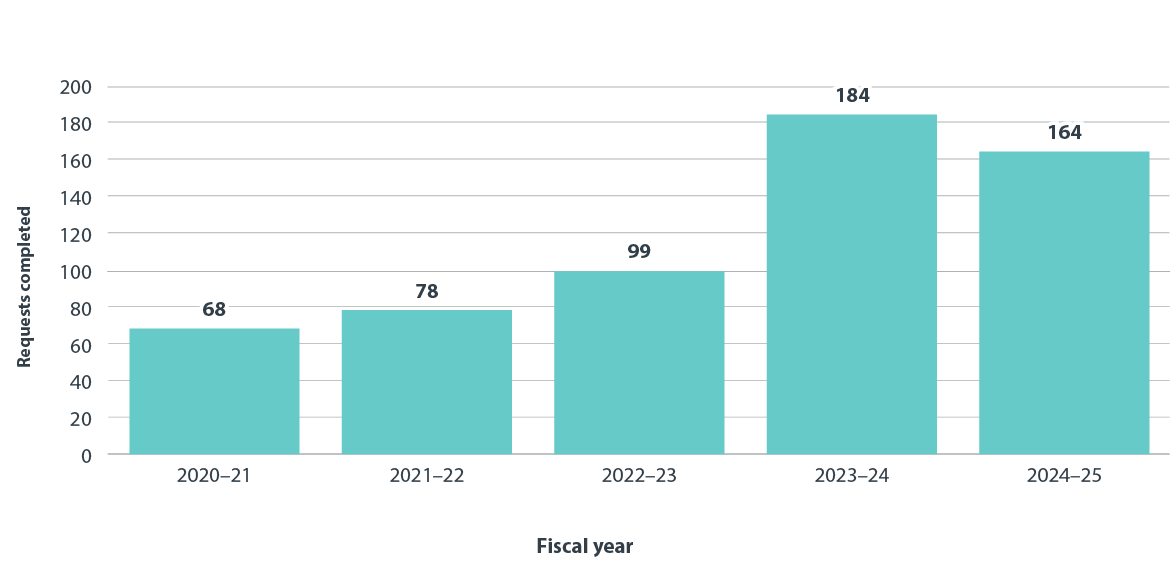
Figure 3 - Text version
| Fiscal year | 2020–21 | 2021–22 | 2022–23 | 2023–24 | 2024–25 |
|---|---|---|---|---|---|
| Requests completed | 68 | 78 | 99 | 184 | 164 |
Disposition of requests completed
The following is a breakdown by disposition of the 164 requests completed in 2024–25:
- 112 requests were abandoned by the requester
- 20 requests had no records
- 20 requests contained records that were all disclosed
- 12 requests contained records that were disclosed in part
The 20 requests that were disclosed entirely in 2024–25 is an increase of 43% compared to the 14 requests disclosed entirely in 2023–24. The 12 partially disclosed requests represent a 29% decrease compared to the 17 requests partially disclosed in 2023–24.
Figure 4 shows the percentage of privacy requests by disposition for 2024–25.
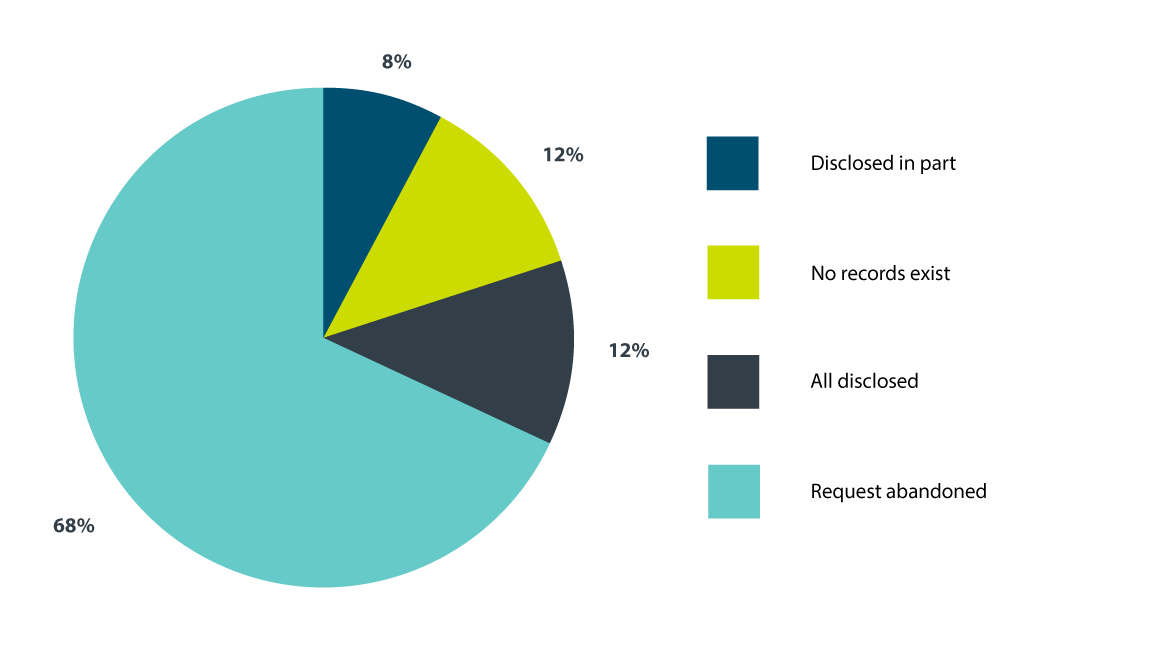
Figure 4 - Text version
| Request abandoned | 112 |
|---|---|
| Disclosed in part | 12 |
| No records exist | 20 |
| All disclosed | 20 |
Exemptions
The PA exempts certain information from being disclosed. In 2024–25, 12 requests contained some information that was subject to exemptions, and, therefore, this information was not disclosed.
A request may have multiple exemptions applied, resulting in a greater number of exemptions invoked than the number of requests. In 2024–25, 12 requests contained information that was subject to the following exemptions:
- personal information about individuals other than the requester (11 requests) (section 26 of the PA)
- personal information related to solicitor–client privilege (6 requests) (section 27 of the PA)
Exclusions
The PA does not apply to or exclude information that is publicly available, such as government publications and material in libraries and museums. The act also excludes material such as cabinet confidences. No requests were subject to an exclusion in 2024–25.
Pages processed and disclosed
TBS completed 164 requests in 2024–25, which involved processing 15,397 pages. This represents a decrease of 22% relative to the 19,663 pages processed in 2023–24.
Figure 5 shows, for 2020–21 to 2024–25, the number of privacy requests TBS completed and the number of pages processed.
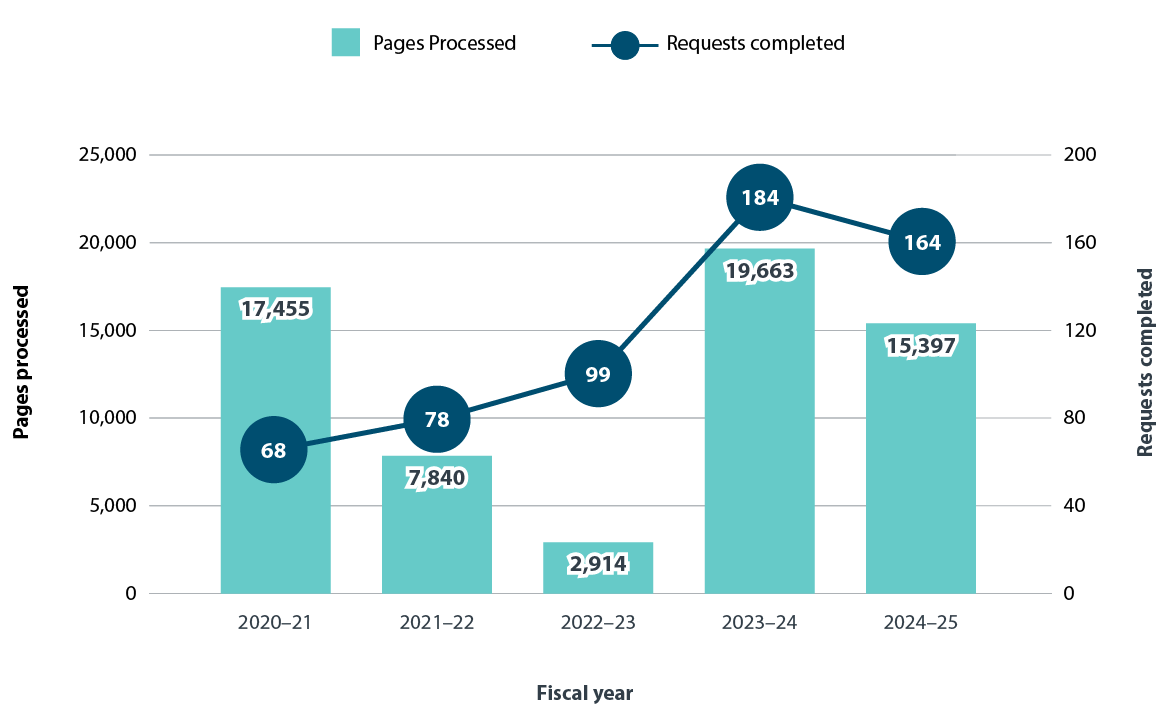
Figure 5 - Text version
| Fiscal year | 2020–21 | 2021–22 | 2022–23 | 2023-24 | 2024-245 |
|---|---|---|---|---|---|
| Pages processed | 17,455 | 7,840 | 2,914 | 19,663 | 15,397 |
| Requests completed | 68 | 78 | 99 | 184 | 164 |
Complexity
Some requests have additional factors that increase the complexity of the request. Examples of these complexities can be that the request requires:
- consultations outside of the institution
- legal advice
- analysis because the request contains sensitive information that can be exempted under the PA
In 2024–25, the 12 requests that were partially disclosed had the following complexities:
- consultations were required with other federal institutions (1 request)
- legal advice was required to process the request (1 request)
- analysis was required because the request contained interwoven informationFootnote 1 (10 requests)
Format of information released
TBS continues to provide clients with access to government records in electronic formats. In 2024–25, TBS released information exclusively in electronic formats for all 32 requests for which records were disclosed.
Requests for translation
Subsection 17(2) of the PA allows requesters to request that a record be provided in a particular official language. Should the record not exist in that official language, the government institution must translate the record if it is deemed necessary to enable the individual to understand the information.
TBS did not receive or process any requests in 2024–25 that required translation of responsive records.
Part 3: on-time compliance rate, completion times and extensions
On-time compliance rate
The on-time compliance rate is the percentage of requests responded to within their legislative timelines, including requests for which the institution invoked legislative extensions. For privacy requests, this means requests were processed and provided to requesters within 30 days, or 60 days if a legal extension was invoked.
In 2024–25, TBS achieved an on-time compliance rate of 94%. This is consistent with the on-time compliance rate of 94% recorded in 2023–24.
Deemed refusals
Government institutions are required to provide access to records within legislative timelines. When an institution fails to provide access to a record within the time limits, the institution is deemed to have refused to give access.
In 2024–25, a total of 10 requests were closed past the legislated timeline for the following reasons:
- interference with operations and workload (8 requests)
- other – difficulty obtaining records (1 request)
- internal consultation (1 request)
Time required to complete requests
Of the 164 requests closed in 2024–25, 90% were closed within 30 days, which is an increase of 2 percentage points from 88% recorded in 2023–24.
Figure 6 shows the time it took to complete privacy requests in 2024–25.
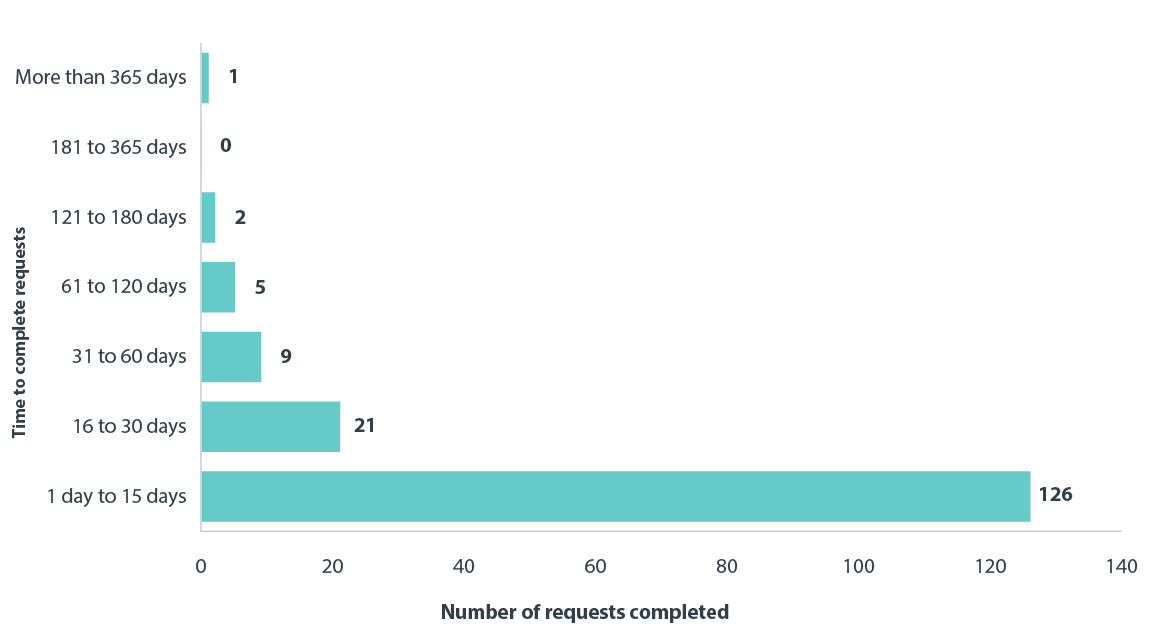
Figure 6 - Text version
| Time to complete requests | 1-15 days | 16-30 days | 31-60 days | 61-120 days | 121-180 days | 181-365 days | more than 365 days |
|---|---|---|---|---|---|---|---|
| Requests completed | 126 | 21 | 9 | 5 | 2 | 0 | 1 |
Reasons for extensions
The legislation sets timelines for responding to privacy requests and allows for extensions, up to a maximum of 30 days, in any of the following cases:
- when complying with the timeline would interfere with operations as a result of:
- a review being required to determine exemptions or exclusions
- a large volume of pages requiring review
- a large volume of requests
- the documents being difficult to obtain
- a consultation being required
- documents that must be translated
In 2024–25, TBS invoked extensions for 8 completed requests, or 5% of all requests completed.
Figure 7 shows the extensions invoked for privacy requests completed in 2024–25.
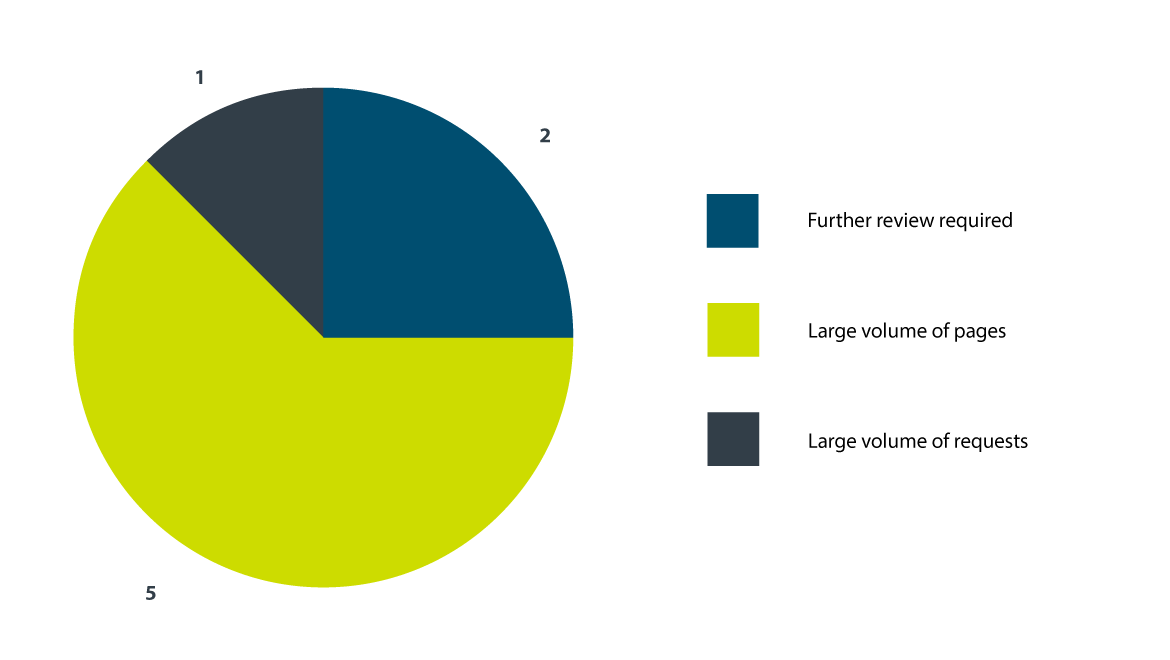
Figure 7 - Text version
| Type of extension | Further review required | Lage volume of pages | Large volume of requests |
|---|---|---|---|
| Number of extensions invoked | 2 | 5 | 1 |
Length of extensions
In 2024–25, TBS completed 8 requests for which extensions had been invoked. All of the 8 requests for which extensions were invoked were extended by 30 calendar days.
Part 4: informal requests
Informal requests received
TBS did not receive any informal privacy requests in 2024–25.
Informal requests completed
TBS did not complete any informal privacy requests in 2024–25.
Informal pages released
TBS did not release any pages informally in 2024–25.
Part 5: consultations from other government institutions and organizations
Consultation requests received and carried forward
TBS received 9 consultation requests from other government institutions in 2024–25 compared to 1 consultation request received in 2023–24.
There were no consultation requests from other government institutions received in 2023–24 that were carried forward to 2024–25.
Consultation requests completed and pages processed
TBS completed 9 consultation requests in 2024–25 and processed 431 pages for these requests. In 2023–24, TBS completed 1 request and processed 11 pages.
Completion time for consultations received from other Government of Canada institutions and other organizations
Of the 9 consultation requests received by TBS in 2024–25, 7 were completed within 30 days and 2 were completed within 60 days.
Part 6: consultations on cabinet confidences
Consultations with legal services
No requests processed by TBS in 2024–25 required consultation with legal services to evaluate cabinet confidences.
Consultations with the Privy Council Office
No requests processed by TBS in 2024–25 required consultation with the Privy Council Office to evaluate cabinet confidences.
Part 7: complaints and investigations
Complaints received
Requesters can file a complaint with the Office of the Privacy Commissioner of Canada (OPC) if they are not satisfied with how their request was processed. Members of the public can also submit complaints to the OPC in relation to the collection, use, disclosure, retention, or disposal of personal information as it relates to programs or initiatives conducted by the department.
In 2024–25, TBS was notified of 17 complaints received by the OPC, which is an increase of 142% compared to the 7 complaints received in 2023–24.
Table 1 shows the types of complaints about TBS received by the OPC in 2024–25.
| Complaint type | Number of complaints |
|---|---|
| Time limits | 0 |
| Delay: deemed refusal | 5 |
| Refusal: exemptions | 8 |
| Refusal: exclusions | 0 |
| Refusal: missing records | 1 |
| Miscellaneous | 3 |
| Total | 17 |
Complaints may also be filed for miscellaneous reasons pertaining to the PA, but not about a specific request. This includes departmental complaints and privacy corrections. Of the 17 complaints received, 1 was a departmental investigation related to the administration of hybrid compliance monitoring in the workplace, and 2 departmental complaints were related to privacy corrections.
Complaint representations
The complaints process has many stages. Initially, the OPC contacts institutions to collect and review the processing file. During an investigation, the OPC must provide institutions with an opportunity to provide representations.
Complaints closed
TBS closed 15 complaint investigations on privacy requests during 2024–25. Of these 15 complaint investigations, the OPC provided letters notifying TBS that it had discontinued 10 of its investigations. Of the remaining 5 investigations, the OPC issued findings: 2 were deemed not well founded, and 3 were deemed well founded.
Table 2 shows the complaint findings issued by the OPC in 2024–25.
| Complaint type | Complaint decision | ||
|---|---|---|---|
| Not well founded | Well founded | discontinued | |
| Time limits | 0 | 0 | 0 |
| Delay: deemed refusal | 0 | 2 | 4 |
| Refusal: exemptions | 0 | 1 | 6 |
| Refusal: exclusion | 0 | 0 | 0 |
| Refusal: missing records | 1 | 0 | 0 |
| Miscellaneous | 1 | 0 | 0 |
Key actions taken on complaints
While resolving complaints filed with OPC is a priority at TBS, the increased number of complaints creates additional challenges for TBS. To ensure the timely resolution of complaints filed with the OPC, TBS established a Special Projects Unit (SPU) in 2024–25 within the Intake and Governance Unit. The SPU is mandated with managing and coordinating the complaint resolution process in TBS by:
- conducting meetings twice a month with operational staff to ensure that complaint resolution is monitored and prioritized
- allocating operational staff dedicated to complaint resolution activities
To further support the efficient resolution of complaints, TBS has also used the extended delegated authority enabling the Access to Information and Privacy Director to approve departmental representations to the OPC. These new authorities have reduced the number of approval levels, which enabled the ATIP office to efficiently address the 175% increase in requests for representations from the OPC in 2024–25.
Departmental complaints filed by the Privacy Commissioner
In 2024–25, the ATIP office closed the departmental complaint regarding Brookfield Global Relocation Services and Sirva Canada.
The OPC is currently completing a privacy investigation related to hybrid compliance.
Part 8: court actions
There were no court cases filed against TBS in relation to the PA in 2024–25.
Part 9: disclosures under subsection 8(2)
Subsection 8(2) of the PA provides limited and specific circumstances under which institutions may disclose personal information without an individual’s consent. Paragraph 8(2)(e) allows for the disclosure of personal information to an investigative body specified in the regulations for the purposes of law enforcement and investigations. Paragraph 8(2)(m) allows for the disclosure of personal information when the public interest clearly outweighs any invasion of privacy or when the disclosure would benefit the individual involved.
In 2024–25, TBS processed 11 requests related to disclosures under subsection 8(2), but did not make any disclosures pursuant to paragraphs 8(2)(e) or 8(2)(m) of the Act. As a result of no disclosures being made pursuant to paragraph 8(2)(m) of the act, TBS did not have any notifications to the OPC pursuant to subsection 8(5).
Part 10: requests for correction of personal information and notations
Subsection 12(2) of the PA entitles individuals to request corrections to personal information that is erroneous or incomplete, and to request a notation to any personal information for which the individual requested a correction that was not completed by the institution.
In 2024–25, TBS received 2 requests to correct personal information.
Part 11: privacy breaches
In 2024–25, TBS had no material privacy breaches that were reported to the OPC.
Over the course of 2024–25, the Privacy Policy Unit also supported TBS program officials with the management of 7 non-material breaches. Most of the privacy breaches were a result of administrative errors. In each of these circumstances, breach containment measures were quickly deployed, and program officials were provided with additional advice on mitigation measures to prevent re-occurrences.
Part 12: privacy impact assessments
The ATIP office provides TBS program officials with support and guidance on the privacy impact assessment (PIA) process. In accordance with the Treasury Board Directive on Privacy Impact Assessment, a PIA must be initiated for a program or activity in the following circumstances:
- when personal information is used for or is intended to be used as part of a decision-making process that directly affects the individual(s)
- when substantial changes are made to existing programs or activities where personal information is used or intended to be used for an administrative purpose
- when the contracting out or the transfer of a program or activity to another level of government or to the private sector results in substantial changes to the program or activities
In 2024–25, TBS submitted the following PIAs to the OPC and the Privacy and Responsible Data Division (PRDD) at TBS:
- Government of Canada Workplace Accessibility Passport PIA
- Using Artificial Intelligence to Automate Candidate Evaluations PIA
- VidCruiter Application Tracker tool PIA
- Phoenix Damages Claims Processing Consolidated PIA
The ATIP office continued to provide support to TBS program officials for numerous ongoing PIAs, including but not limited to the following key initiatives:
- TBS Application Portal authentication
- classification certification program
- MyGCHR
- myWorkArrangements
Part 13: resources related to the Privacy Act
Costs
In 2024–25, TBS’s total cost for administering the PA was $810,258, which was allocated exclusively to salary costs. Employees who had shared efforts between the ATIA and the PA are reflected in both reports proportional with the time spent on each act.
Human resources
In 2024–25, there were 8 full-time equivalents (FTEs) in the ATIP office performing work associated with the application of the PA.
Initiatives and projects to improve privacy
Departmental support for document review
The ATIP office often provides departmental support by conducting document reviews of records outside of the PA. Document reviews involving personal information are conducted by the Privacy Policy Unit to support the department in the review of information pertaining to the following activities:
- publication of information
- parliamentary questions
In 2024–25, the ATIP office conducted:
- 4 reviews for publications made by TBS to the Open Government Portal
- 2 reviews on responses to parliamentary questions
- 24 reviews for proactive disclosure requests relating to travel and hospitality expense entries on the Open Government website
Privacy consultations within TBS
The Privacy Policy Unit within the ATIP office acts as a source of expertise for TBS program officials. The unit provides privacy assessment tools to ensure that program officials take appropriate measures in the planning stages of new initiatives to ensure legal and policy compliance. Tools and guidance materials are regularly updated to adapt to the ever-changing privacy ecosystem (such as cyber security threats, use of artificial intelligence).
Over the course of 2024–25, the Privacy Policy Unit provided privacy advice on provisions and policy requirements set out in the PA on 300 occasions, representing a 17% increase compared to 2023–24. This trend is attributed to the number of new and forward-looking program initiatives involving the potential collection, use and disclosure of personal information in areas of people management, employment equity and diversity, and the increase in government-wide employee engagement and public outreach activities.
Information holdings
TBS publishes an inventory of its information holdings and relevant details about personal information under its control. The information can help individuals make an access to information or personal information request, or exercise their privacy rights. The inventory also supports the federal government’s commitment to transparency and facilitates access to information related to its activities.
During this reporting period, the Info Source chapter refresh was finalized. All personal information bank and privacy impact assessment lists were updated as a result of in-depth engagement with TBS-PRDD.
A description of TBS’s functions, programs, activities and related information holdings can be found in Info Source: Treasury Board of Canada Secretariat.
Education, training and awareness
The ATIP office conducted several training activities to support departmental compliance with the PA in 2024–25.
Each , the ATIP office commemorates Data Privacy Day. This day highlights the impact technology is having on our privacy rights and underlines the importance of valuing and protecting personal information. For the 2024–25 Data Privacy Day, the ATIP office launched a 4-part internal communication series on privacy.
Table 3 outlines specific training initiatives conducted by the ATIP office in 2024–25.
| Initiative | Sector | Description | Responsible unit | Participants |
|---|---|---|---|---|
| Privacy Act training | Human Resources Division (HRD), Claims Office | Stream Video Privacy training module on privacy awareness, roles and responsibilities | Privacy Policy Unit | 24 |
| Privacy training | HRD | Privacy training following a privacy incident | Privacy Policy Unit | 6 |
| Privacy training | Claims Office | Privacy training following a privacy incident | Privacy Policy Unit | 14 |
ATIP tools to support departmental officials
The TBS ATIP office continued its efforts to ensure that departmental officials had access to tools to support them in their responsibilities under the Act. In 2024–25, the TBS ATIP office:
- provided training on the ATIP sector response form
- developed a plain language guide for exemptions and exclusions of the ATIA and the PA
- updated the departmental intranet page to provide employees with quick access to all ATIA resources
Training for ATIP employees
TBS continued to support the professional development of ATIP employees through various mechanisms in 2024–25, including but not limited to:
- training offered by the TBS Access to Information and Privacy Community Development Office
- Information Access and Protection of Privacy certification courses from the University of Alberta
- Canadian Access and Privacy Association annual conference
- language training
Policies, guidelines and procedures
Extension of the ATIP delegation order to improve efficiency
In , the ATIP delegation order was expanded to provide additional authorities to managers and team leaders of the ATIP office. Extending the delegation order to reduce operational bottlenecks and to empower more individuals in the ATIP office is one component of the ATIP office’s modernization strategy aimed at increasing overall efficiency.
In 2024–25, TBS launched a phased implementation of the extended authorities under the delegation order to team leaders. The Intake, Governance, and Special Projects Unit used these extended authorities successfully in 2024–25 and demonstrated that removing multiple approval levels increased efficiency and operational outputs.
Update to the privacy questionnaire and Privacy Breach reporting
The ATIP office made significant updates to the privacy questionnaire in 2024–25. Formally titled the “PIA Checklist,” this new questionnaire is much more comprehensive and makes the PIA process easier for officials. The Privacy Breach reporting form was also updated in 2024–25, and it is now more comprehensive and easier to use.
Monitoring compliance
The ATIP office produces a variety of regular and ad hoc reports to monitor TBS’s compliance with the ATIA. In 2024–25, the ATIP office continued its emphasis on data analytics to identify emerging trends and promote procedural efficiencies.
The ATIP office creates and distributes several reports outlining the performance of the ATIP office and the challenges it faces. These reports include:
- quarterly reports on sector performance and quality of record retrieval
- ATIP Performance Dashboards to senior management on the monthly performance of the ATIP office
- weekly reports on requests received and requests that will be closed
- reports to the executive committee with statistics on the ATIP office, including requests received and closed, complaints and the on-time compliance rates
- service inventory
- annual statistical reports to TBS
Conclusion
The ATIA and the PA are important pillars in maintaining the accountability and transparency of federal institutions, promoting an open and democratic society, and protecting the privacy of individuals. While TBS had a productive 2024–25, it is recognized that there are outstanding challenges and additional opportunities to achieve excellence for Canadians.
Transparency and accountability are an ongoing commitment. TBS looks forward to building on the successes of 2024–25 and continuing to uphold these principles for Canadians in 2025–26.
Appendix A. Delegation Order – Privacy Act
I, undersigned, President of the Treasury Board, pursuant to section 73 of the Privacy Act hereby designate the ATIP officers; the Access to Information and Privacy Team Leader; the Access to Information and Privacy Manager; the Access to Information and Privacy Director; the Senior Director, Ministerial Services; the Assistant Secretary, Strategic Communications and Ministerial Affairs; and the Secretary, or person occupying those positions on an acting basis, to exercise signing authorities or perform any of the President’s powers, duties or function as head of institution that are specified in the attached Schedule B. This designation replaces all previous delegation orders.
Original signed by
The Honourable Anita Anand
President of the Treasury Board
Date:
| Position | Powers, duties or functions |
|---|---|
| Secretary | Full authority |
| Assistant Secretary, Strategic Communications and Ministerial Affairs | Full authority |
| Senior Director, Ministerial Services | Full authority, except: Subsections: 35(1), 36(3), 37(3) |
| Director, Access to Information and Privacy | Full authority, except: Subsections: 35(1), 36(3), 37(3) |
| Manager, Access to Information and Privacy | Full authority, except: Subsections: 33(2), 35(1), 36(3), 37(3) |
| Team Leader, Access to Information and Privacy | Full authority, except: Subsections: 33(2), 35(1), 36(3), 37(3) |
| Access to Information and Privacy Officers | Paragraph: 14(a) |
© His Majesty the King in Right of Canada, as represented by the President of the Treasury Board, 2025
ISSN: 2371-3038